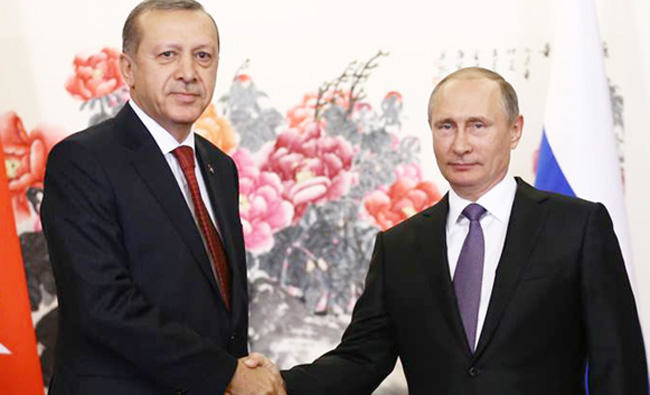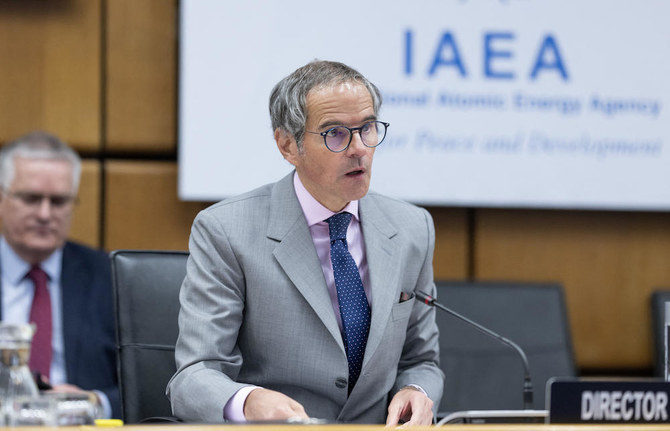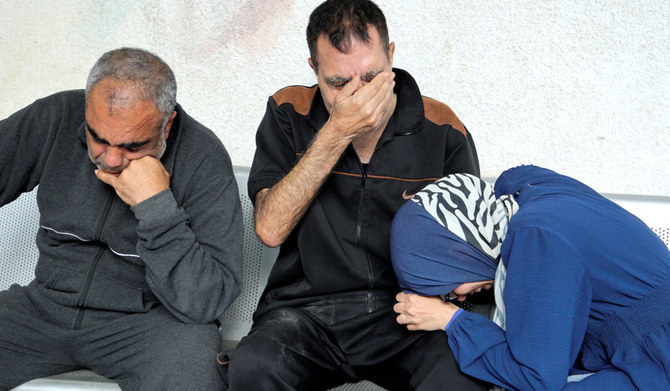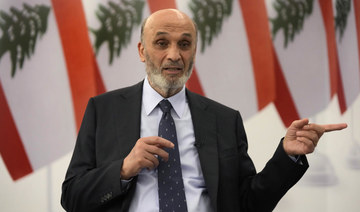ABOARD THE TCG ALEMDAR: In blazing sunlight, two dozen US and Turkish sailors on a NATO exercise lower an American diving bell from an advanced Turkish rescue ship, sending it deep under the Aegean Sea where it is secured to a submarine.
Part of a combined NATO rescue simulation this week off Turkey’s southwest coast, the seamless cooperation at sea comes amidst a storm between Ankara and its alliance allies who are concerned about its decades-old commitment to the organization.
Under President Tayyip Erdogan, Turkey, with NATO’s second-biggest army, has sought to bolster ties with Russia and Iran.
In a clear sign of rapprochement, Ankara is buying a missile defense system from Russia — unnerving NATO officials, who are already wary of Moscow’s military presence in the Middle East, as the system is incompatible with the alliance’s systems.
Turkey said it opted for the S-400 anti-aircraft system because Western arms suppliers had not offered a “financially effective” alternative. The Pentagon said it expressed concern to Turkey about the deal.
“They went crazy because we made the S-400 agreement. What were we supposed to do, wait for (them)?” Erdogan said recently.
“If we have difficulty in obtaining any defense element from some places, if our initiatives are often frustrated by obstacles, what will we do? We will sort it out on our own.”
Erdogan’s frustration stems from Washington’s support for the Syrian Kurdish YPG in the fight against Daesh. Ankara sees the YPG as an extension of the outlawed Kurdistan Workers Party (PKK), which has carried out an insurgency in Turkey’s largely Kurdish southeast and is considered a terrorist organization by the United States and Europe as well as Turkey.
Angered by indictment
The president was also angry that US prosecutors charged his former economy minister for conspiring to violate US sanctions on Iran. The indictment marked the first time an ex-government member with close ties to Erdogan had been charged in the investigation that has strained relations between Washington and Ankara.
“Part of the reason Erdogan is doing this S-400 deal is he’s angry with the US over the indictment of the former economy minister as well as continued US cooperation with the YPG,” said Soner Cagaptay, a fellow at the Washington Institute think-tank and author of “The New Sultan: Erdogan and the Crisis of Modern Turkey.”
“He’s using the S-400 as a lever, in terms of bargaining, to convince Washington to change its mind on a number of issues.”
Ties with Europe, especially Germany, were hit by Turkey’s crackdown after last year’s failed coup. Some 150,000 people were purged from the civil service, military and private sector and over 50,000 jailed, including German nationals.
Alarmed by what it sees as Ankara’s deteriorating record on human rights, Germany has said it would restrict some arms sales to Turkey. It initially announced a freeze on major arms sales, but scaled that back, citing the fight against Daesh.
Ankara also refused to allow German lawmakers to visit their troops stationed at an air base in Turkey. This has led Germany to move troops involved in the campaign against Daesh from Turkey’s Incirlik base to Jordan.
Not an alternative
Turkey rejects the idea it is turning away from the West.
“The good relations Turkey has developed with Russia are not an alternative to the good relations it has with the West, they complement each other,” Erdogan spokesman Ibrahim Kalin said.
Erdogan told Reuters in an interview on Thursday that Turkey’s position in NATO had not been weakened by the deal. Still, some fear Turkey might eventually find itself at the periphery of the alliance.
“Germany is our most important supplier of weapons after the United States,” said Umit Pamir, a former Turkish diplomat. He said the suspension of arms sales, would “surely impact our defense systems.”
Erdogan has been on a push to improve ties with Moscow after Turkey’s economy, particularly its tourism industry, was shaken by sanctions imposed by Russia after Turkey shot down one of its warplanes over Syria in late 2015.
He is due to meet Russian President Vladimir Putin next week to discuss a plan agreed by their countries and Iran to reduce the fighting in Syria’s northwestern Idlib province.
Different sides in Syria
Turkey supports rebels against Syrian President Bashar Assad, who is backed by Russia and Iran.
Erdogan plans to visit Iran next month. The two countries agreed in August to boost military cooperation when Iran’s military chief, Gen. Mohammad Baqeri, met Erdogan in a visit. The trip was the first by an Iranian military chief of staff to Turkey since the 1979 Islamic revolution in Iran.
While they back opposite sides in Syria, Ankara and Tehran have found some common ground over their opposition to the Kurdish independence referendum in Iraq. Both countries fear that an independent Kurdish state could inflame separatists tensions with their Kurdish minorities.
Recent discord over the S-400 purchase did not signal a drastic break from NATO for Turkey, said Mustafa Kibaroglu, a professor of international relations at Turkey’s MEF University. He said the West had over-reacted to the purchase.
“I don’t think there is any debate about Turkey leaving an alliance it has invested so much in,” Kibaroglu said.
“Are we going to bring down US planes with our S-400s?” he said. “There is no backbone to these comments, it is purely political polemics, and we are not the ones doing this.”
Turkish missile deal with Russia reflects stormy ties with NATO
Turkish missile deal with Russia reflects stormy ties with NATO

UN atomic watchdog chief due in Iran as concern grows over nuclear activity

- Visit comes at a time of heightened regional tensions and with IAEA criticizing Iran for lack of cooperation on inspections and other outstanding issues
TEHRAN: UN atomic watchdog chief Rafael Grossi is set to arrive in Iran on Monday, where he is expected to speak at a conference and meet officials for talks on Tehran’s nuclear program.
The visit comes at a time of heightened regional tensions and with the International Atomic Energy Agency (IAEA) criticizing Iran for lack of cooperation on inspections and other outstanding issues.
Grossi, head of the IAEA, is expected to deliver a speech at Iran’s first International Conference on Nuclear Science and Technology.
The three-day event, which starts on Monday, is being held in Isfahan province, home to the Natanz uranium enrichment plant and where strikes attributed to Israel hit last month.
The IAEA and Iranian officials reported “no damage” to nuclear facilities after the reported attack on Isfahan, widely seen as Israel’s response to Iran’s first-ever direct attack on its arch foe days earlier, which itself was a retaliation for a deadly strike on Tehran’s Damascus consulate.
During his visit, Grossi is expected to meet with Iranian officials including the Islamic republic’s nuclear chief Mohammad Eslami.
On Wednesday Eslami, head of the Atomic Energy Organization of Iran, said he was “sure that these negotiations will further help clear ambiguities, and we will be able to strengthen our relations with the agency.”
Iran in recent years has deactivated IAEA monitoring devices at nuclear facilities and barred inspectors, according to the UN agency.
Grossi last visited Iran in March 2023 and met with top officials including President Ebrahim Raisi.
Iran has suspended its compliance with caps on nuclear activities set by a landmark 2015 deal with major powers after the United States in 2018 unilaterally withdrew from the agreement and reimposed sweeping sanctions.
Tensions between Iran and the IAEA have repeatedly flared since the deal fell apart, while EU-mediated efforts have so far failed both to bring Washington back on board and to get Tehran to again comply with the terms of the accord.
Last year, Iran slowed down the pace of its uranium enrichment, which was seen as a goodwill gesture while informal talks began with the United States.
But the Vienna-based UN nuclear agency said Iran accelerated the production of 60-percent enriched uranium in late 2023.
Enrichment levels of around 90 percent are required for military use.
Tehran has consistently denied any ambition to develop nuclear weapons, insisting that its atomic activities were entirely peaceful.
In February, the IAEA said in a confidential report seen by AFP that Iran’s estimated stockpile of enriched uranium had reached 27 times the limit set out in the 2015 accord.
On Sunday, the Iranian official news agency IRNA said Grossi’s visit provides “an opportunity for the two sides to share their concerns,” especially with regard to the IAEA’s inspectors.
Iran in September withdrew the accreditation of several inspectors, a move described at the time by the UN agency as “extreme and unjustified.”
Tehran, however, said its decision was a consequence of “political abuses” by the United States, France, Germany and Britain.
Eslami said the IAEA has “more than 130 inspectors” working in Iran, insisting Tehran remains committed to cooperating with the nuclear watchdog.
Lebanon’s Hezbollah says fired dozens of rockets at Israeli base

- The Israeli army said its warplanes “struck a Hezbollah military structure... deep inside Lebanon,”
The Iran-backed Hezbollah group said it fired “dozens of Katyusha rockets” at an Israeli base in the occupied Golan Heights on Monday in retaliation for a strike in Lebanon’s east.
Earlier, Lebanese official media said three people had been wounded in an Israeli strike early Monday in the country’s east, with the Israeli army saying it had struck a Hezbollah “military compound.”
Hezbollah fighters launched “dozens of Katyusha rockets” targeting “the headquarters of the Golan Division... at Nafah base,” the group said in a statement, saying it was “in response to the enemy’s attack targeting the Bekaa region.”
Israel and Lebanon’s Hezbollah have exchanged regular cross-border fire since Palestinian militant group Hamas’s unprecedented October 7 attack on southern Israel sparked war in the Gaza Strip.
In recent weeks Hamas-ally Hezbollah has stepped up its attacks on northern Israel, and the Israeli military has struck deeper into Lebanese territory.
“Enemy warplanes launched a strike at around 1:30 am this morning on a factory in Sifri, wounding three civilians and destroying the building,” Lebanon’s official National News Agency said.
Sifri is located in Lebanon’s Bekaa Valley, near the city of Baalbek, around 80 kilometers from the Israel-Lebanon frontier.
The Israeli army said its warplanes “struck a Hezbollah military structure... deep inside Lebanon,” referring to the location as “Safri.”
Last month, a building in Sifri was targeted in an Israeli raid, according to a source close to Hezbollah, while the Israeli army said it had targeted Hezbollah sites in Lebanon’s east.
East Lebanon’s Baalbek area is a Hezbollah stronghold and has been repeatedly struck by Israel in recent weeks.
On Sunday official media in Lebanon said an Israeli strike on a southern village killed four family members, with Hezbollah announcing retaliatory fire by dozens of rockets toward Kiryat Shmona in northern Israel.
The intensifying exchanges have stoked fears of all-out conflict between Israel and Hezbollah, which went to war in 2006.
In Lebanon, at least 390 people have been killed in nearly seven months of cross-border violence, mostly militants but also more than 70 civilians, according to an AFP tally.
Israel says 11 soldiers and nine civilians have been killed on its side of the border.
Tens of thousands of people have been displaced on both sides.
Israel attacks Rafah after Hamas claims responsibility for deadly rocket attack

- Hamas claims attack on Kerem Shalom crossing into Gaza that Israel says killed three soldiers
- Sunday's attack on the crossing came as hopes dimmed for ceasefire talks underway in Cairo
CAIRO: Three Israeli soldiers were killed in a rocket attack claimed by Hamas armed wing, near the southern Gaza Strip city of Rafah, where Palestinian health officials said at least 19 people were killed by Israeli fire on Sunday.
Hamas's armed wing claimed responsibility on Sunday for an attack on the Kerem Shalom crossing into Gaza that Israel said killed three of its soldiers.
Israel's military said 10 projectiles were launched from Rafah in southern Gaza towards the area of the crossing, which it said was now closed to aid trucks going into the coastal enclave. Other crossings remained open.
Hamas' armed wing said it fired rockets at an Israeli army base by the crossing, but did not confirm where it fired them from. Hamas media quoted a source close to the group as saying the commercial crossing was not the target.
More than a million Palestinians are sheltering in Rafah, near the border with Egypt.
Shortly after the Hamas attack, an Israeli airstrike hit a house in Rafah killing three people and wounding several others, Palestinian medics said.
The Israeli military confirmed the counter-strike, saying it struck the launcher from which the Hamas projectiles were fired, as well as a nearby "military structure".
"The launches carried out by Hamas adjacent to the Rafah Crossing ... are a clear example of the terrorist organisation's systematic exploitation of humanitarian facilities and spaces, and their continued use of the Gazan civilian population as human shields," it said.
Hamas denies it uses civilians as human shields.
Just before midnight, an Israeli air strike killed nine Palestinians, including a baby, in another house in Rafah, Gaza health officials said. They said the new strike increased the death toll on Sunday to at least 19 people.
Israel has vowed to enter the southern Gaza city and flush out Hamas forces there, but has faced mounting pressure to hold fire as the operation could derail fragile humanitarian efforts in Gaza and endanger many more lives.
Sunday's attack on the crossing came as hopes dimmed for ceasefire talks under way in Cairo.
The war began after Hamas stunned Israel with a cross-border raid on Oct. 7 in which 1,200 people were killed and 252 hostages taken, according to Israeli tallies.
More than 34,600 Palestinians have been killed, 29 of them in the past 24 hours, and more than 77,000 have been wounded in Israel's assault, according to Gaza's health ministry.
Israel army says east Rafah evacuation a ‘limited scope operation’

- More than a million Palestinians are sheltering in Rafah, near the border with Egypt
- Three Israeli soldiers earlier killed in a rocket attack claimed by Hamas armed wing
CAIRO/JERUSALEM: The Israeli army on Monday said its operation to begin evacuating residents of eastern Rafah in the Palestinian territory of Gaza was temporary and limited.
“This morning ... we began a limited scope operation to temporarily evacuate residents in the eastern part of Rafah,” a military spokesman told journalists in an online riefing. “This is a limited scope operation.”
According to a radio report, the evacuations were now focused on a few peripheral districts of Rafah, from which, it said, evacuees would be directed to tent cities in nearby Khan Younis and Al-Muwassi.
Seven months into its offensive against Hamas, Israel has said Rafah harbors thousands of the Palestinian Islamist group’s fighters and that victory is impossible without taking the city.
But with more than a million displaced Palestinians sheltering in Rafah, the prospect of a high-casualty operation worries Western powers and neighboring Egypt.
Three Israeli soldiers were earlier killed in a rocket attack claimed by Hamas armed wing, near the southern Gaza Strip city of Rafah, where Palestinian health officials said at least 19 people were killed by Israeli fire on Sunday.
Hamas’s armed wing claimed responsibility on Sunday for an attack on the Kerem Shalom crossing into Gaza that Israel said killed three of its soldiers.
Israel’s military said 10 projectiles were launched from Rafah in southern Gaza towards the area of the crossing, which it said was now closed to aid trucks going into the coastal enclave. Other crossings remained open.
Hamas’ armed wing said it fired rockets at an Israeli army base by the crossing, but did not confirm where it fired them from. Hamas media quoted a source close to the group as saying the commercial crossing was not the target.
More than a million Palestinians are sheltering in Rafah, near the border with Egypt.
Shortly after the Hamas attack, an Israeli airstrike hit a house in Rafah killing three people and wounding several others, Palestinian medics said.
The Israeli military confirmed the counter-strike, saying it struck the launcher from which the Hamas projectiles were fired, as well as a nearby “military structure”.
“The launches carried out by Hamas adjacent to the Rafah Crossing ... are a clear example of the terrorist organisation’s systematic exploitation of humanitarian facilities and spaces, and their continued use of the Gazan civilian population as human shields,” it said.
Hamas denies it uses civilians as human shields.
Just before midnight, an Israeli air strike killed nine Palestinians, including a baby, in another house in Rafah, Gaza health officials said. They said the new strike increased the death toll on Sunday to at least 19 people.
Israel has vowed to enter the southern Gaza city and flush out Hamas forces there, but has faced mounting pressure to hold fire as the operation could derail fragile humanitarian efforts in Gaza and endanger many more lives.
Sunday’s attack on the crossing came as hopes dimmed for ceasefire talks under way in Cairo.
The war began after Hamas stunned Israel with a cross-border raid on Oct. 7 in which 1,200 people were killed and 252 hostages taken, according to Israeli tallies.
More than 34,600 Palestinians have been killed, 29 of them in the past 24 hours, and more than 77,000 have been wounded in Israel’s assault, according to Gaza’s health ministry.
Netanyahu uses Holocaust ceremony to brush off international pressure against Gaza offensive

- The ceremony ushered in Israel’s first Holocaust remembrance day since the Oct. 7 Hamas attack that sparked the war, imbuing the already somber day with additional meaning
JERUSALEM: Israeli Prime Minister Benjamin Netanyahu on Sunday rejected international pressure to halt the war in Gaza in a fiery speech marking the country’s annual Holocaust memorial day, declaring: “If Israel is forced to stand alone, Israel will stand alone.”
The message, delivered in a setting that typically avoids politics, was aimed at the growing chorus of world leaders who have criticized the heavy toll caused by Israel’s military offensive against Hamas militants and have urged the sides to agree to a ceasefire.
Netanyahu has said he is open to a deal that would pause nearly seven months of fighting and bring home hostages held by Hamas. But he also says he remains committed to an invasion of the southern Gaza city of Rafah, despite widespread international opposition because of the more than 1 million civilians huddled there.
“I say to the leaders of the world: No amount of pressure, no decision by any international forum will stop Israel from defending itself,” he said, speaking in English. “Never again is now.”
Yom Hashoah, the day Israel observes as a memorial for the 6 million Jews killed by Nazi Germany and its allies in the Holocaust, is one of the most solemn dates on the country’s calendar. Speeches at the ceremony generally avoid politics, though Netanyahu in recent years has used the occasion to lash out at Israel’s archenemy Iran.
The ceremony ushered in Israel’s first Holocaust remembrance day since the Oct. 7 Hamas attack that sparked the war, imbuing the already somber day with additional meaning.
Hamas militants killed some 1,200 people in the attack, making it the deadliest violence against Jews since the Holocaust.
Israel responded with an air and ground offensive in Gaza, where the death toll has soared to more than 34,500 people, according to local health officials, and about 80 percent of Gaza’s 2.3 million people are displaced. The death and destruction has prompted South Africa to file a genocide case against Israel in the UN’s world court. Israel strongly rejects the charges.
On Sunday, Netanyahu attacked those accusing Israel of carrying out a genocide against the Palestinians, claiming that Israel was doing everything possible to ensure the entry of humanitarian aid to the Gaza Strip.
The 24-hour memorial period began after sundown on Sunday with a ceremony at Yad Vashem, Israel’s national Holocaust memorial, in Jerusalem.
There are approximately 245,000 living Holocaust survivors around the world, according to the Claims Conference, an organization that negotiates for material compensation for Holocaust survivors. Approximately half of the survivors live in Israel.
On Sunday, Tel Aviv University and the Anti-Defamation League released an annual Antisemitism Worldwide Report for 2023, which found a sharp increase in antisemitic attacks globally.
It said the number of antisemitic incidents in the United States doubled, from 3,697 in 2022 to 7,523 in 2023.
While most of these incidents occurred after the war erupted in October, the number of antisemitic incidents, which include vandalism, harassment, assault, and bomb threats, from January to September was already significantly higher than the previous year.
The report found an average of three bomb threats per day at synagogues and Jewish institutions in the US, more than 10 times the number in 2022.
Other countries tracked similar rises in antisemitic incidents. In France, the number nearly quadrupled, from 436 in 2022 to 1,676 in 2023, while it more than doubled in the United Kingdom and Canada.
“In the aftermath of the October 7 war crimes committed by Hamas, the world has seen the worst wave of antisemitic incidents since the end of the Second World War,” the report stated.
Netanyahu also compared the recent wave of protests on American campuses to German universities in the 1930s, in the runup to the Holocaust. He condemned the “explosion of a volcano of antisemitism spitting out boiling lava of lies against us around the world.”
Nearly 2,500 students have been arrested in a wave of protests at US college campuses, while there have been smaller protests in other countries, including France. Protesters reject antisemitism accusations and say they are criticizing Israel. Campuses and the federal government are struggling to define exactly where political speech crosses into antisemitism.
















